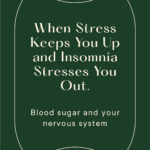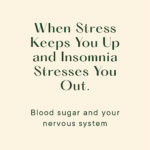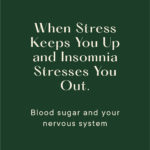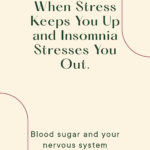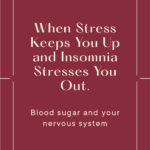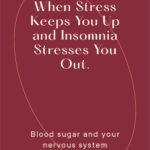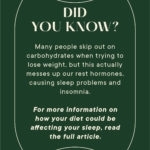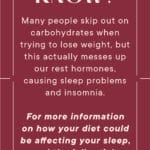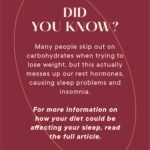“Get some sleep.” they say. But HOW?!
Unfortunately, stress can cause people to stay awake at night. However, getting the right amount of sleep can help eventually reduce your stress levels.
Everyone tells you to get some sleep but with your track record of insomnia and restless nights, you roll your eyes and assume it’s just the way you’re built. Something you have to live with. Well, if that’s you, keep reading. We know the top two reasons people aren’t sleeping, including you.
We’ll cut to the chase: Its unregulated blood sugar levels and a keyed-up nervous system. Here are our top 6 tips to help you bring them back in line.
First, sleep is more than storing information in your brain
If you don’t get the right amount of sleep, your mind cannot be at its best. You already know this – you’re groggy, quick to irritation, and reaching for that caffeine drip mid-afternoon. It’s an understatement to say you don’t function properly and may make some serious mistakes.
What we’re mostly focused on here at Your Daily™ is not getting enough sleep can lead to quick declines in your health.
Amazing research in the last five years showed us that when we sleep our brain shrinks and then goes through a ‘wash cycle’ of sorts. This wash cycle clears the brain of buildup from the day. The fluid present in the brain and spinal cord — called the cerebrospinal fluid — washes in and out, like waves, helping the brain get rid of accumulated metabolic “trash.”
When you are deprived of sleep, your body also doesn’t get a chance to “take the trash out” so to speak in regards to cellular health. During our sleep cycles, our cells are renewed and the junk ones disposed of. In addition, it’s not until we’re deep in the REM cycle that we produce hormones that are necessary for us to use in the morning.
Without sleep, we’re unable to do these magic processes and the accumulation of bad cells impacts our ability to function properly. Just like a machine that gets a buildup of grease, it can stop even the strongest of motors.

1. Eat the right foods.
So many people skip carbohydrates because they think they’re making them gain weight. Actually, lack of sleep could be the cause of the weight issues. By adding the right complex carbohydrates – beets, turnips, sweet potatoes, etc – we create sustained energy for our body and also something for the good bacteria in our gut to feed on to help us create regulatory hormones for resting.
2. Eat at at the right times.
Eating at the proper times during the day and eating the right kinds of foods, can help you to sleep better at night, as well.
Digesting and sleeping are very different functions for our bodies, yet we often treat them as one by eating a large meal and then going to bed. Many busy people skip meals and then wolf down their entire day’s worth of calories in one go at night. If you have a heavy meal right before you are going to bed, your body is working hard to digest rather than doing its normal cleaning and repairing cycles mentioned above.
Eating both the right foods, and throughout the day is setting us up for better digestion and more regulated blood sugar levels.
3. Avoid alcohol in excess.
This seems counterintuitive as alcohol makes you sleepy. However, alcohol also has large concentrated amounts of sugar which cause large blood sugar swings. After a few hours of sleep, your sugar levels will likely dip. To combat the low sugar dip, your body taps into its fat stores, and to do that it uses cortisol and adrenaline, waking you up in the middle of the night as these are your waking and “get moving” hormones. So now you’re wide awake and have a difficult time getting back to sleep. (Most likely what you’re calling insomnia.)
If you’re going to have a drink in the day, make it a small one and cut yourself off two hours before bedtime. Your blood sugar will be more even and allow you to stay asleep throughout the night.
4. Move on a regular basis.
Exertion and movement help to regulate blood sugars. For example, if you go for a walk after your meal you’ll get the benefit of regulated blood sugars for up to 4 hours! Movement helps our circulatory system and flushes our lymphatic system, which can only be flushed with movement – it doesn’t have its own pump system.
While exercise may give you energy throughout the day, when you go to bed at night, it will help you to sleep better. Some people find that exercising in the evening causes them to be wired, while others feel deeply relaxed. You’ll need to experiment to see which camp you fall in.
5. Destress the system.
We call this the manual reset button around here. If you live inside your head most of the day and drag your body along for the ride, it’s most likely stuck in a stress loop called the HPA axis. This means your central nervous system is on alert for the next danger and is in a hyper-aroused state.
A way to send a love note to your central nervous system to take it down a notch is a series of vagal tone exercises. You can find a series of these inside the Noemi app as well as read about them here.
6. Hum your way to chill.
This one is quick and the effects are GOOOOOOD. You’re going to make your lips into a circle, like you’re whistling and then hum the syllable “voo.” Make the register low so you sound like you’re a foghorn calling in the boats to shore. Your lips will tingle and so will your throat and possibly chest. Take a deep inhale through your nose and exhale the sound vooo slow and steady.
The vibration helps to stimulate your vagal nerve and relax it. Repeat this several times with your eyes closed. For a more pronounced effect, keep your head forward while you look out the corner of your eye to the left for a breath, then repeat on the right for another breath.
Last resort: See a doctor if you have sleeping problems that persist.
Hopefully, if you do resort to seeing a doctor, they will find solutions that are not drug-dependent. Prescription drugs may help your sleep problems in the short term but don’t do much to fix the reason why you are not getting sleep, they only mask the underlying issues. Press your doctor for alternative solutions if drugs are being prescribed.
And if you haven’t given each of the above several tries to let them work, go back to the start and try again.






